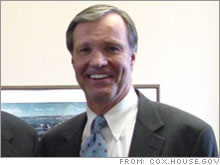 |
| Christopher Cox, President Bush's nominee to head the SEC. |
|
|
|
|
|
|
|
NEW YORK (CNN/Money) - When President Bush tapped prominent California Congressman and fellow Republican Christopher Cox to lead the Securities and Exchange Commission, many on Wall Street cheered while prominent Democrats jeered.
But what does his nomination really mean for big business?
Certainly, Cox, a Republican who has served in Congress since 1988, is perceived as pro-business on many issues, but also tough on corporate crime -- leading some to speculate that he'd probably focus on enforcing current regulations rather than enacting a lot of new rules.
This makes Cox an interesting successor to outgoing chairman William Donaldson in the eyes of hedge fund managers. One of Donaldson's major initiatives during his 2-1/2-year tenure was a drive to make hedge funds register with the SEC under the Investment Advisers Act of 1940. The commission voted to approve the controversial rule by a slim 3-2 majority last year.
Observers think Cox is unlikely to undo Donaldson's handiwork on the hedge fund rule.
"I think it's difficult to say what his regulatory approach will be, but I do think it will be slightly more conservative, and more in line with the Republican approach" to issues such as the hedge fund registration rule, said Jedd Wider, a partner in the New York office of law firm Orrick, Herrington and Sutcliffe.
Those in favor of registration noted that with hedge funds growing from about $330 billion in assets in 2000 to about $1 trillion today, the funds have grown large enough to move markets.
Steve Holzman, who manages the $1.2 billion equity hedge fund Vantis Capital in Los Angeles, is one of few hedge fund managers who has gone public in support of hedge fund registration. His firm has been registered with the SEC since 1992.
"When you're doing something with other people's money it's imperative that there be some type of regulation," Holzman said. "I'm dismayed by the number of shady characters and nonexistent barriers to entry (in the hedge fund business). You need some type of registration."
A delicate balance
Holzman, who describes himself as a "moderate Republican or a conservative Democrat, depending on my mood," said he is a big fan of Cox and feels the Congressman will strike the right balance between protecting investors and allowing free markets to operate unobstructed.
"I don't want to see over-regulation, but it shouldn't be a free-for-all," Holzman said. "I don't think he's going to come in and reverse (Donaldson's rule). I think there is demand from investors to have some regulation."
But opponents argue that hedge funds typically cater to sophisticated investors who can afford to take risks, and that the SEC shouldn't waste resources on this type of investor. Not surprisingly, hedge fund managers who opposed registration are happy to see Donaldson go.
"It seems like [Cox] will be a big improvement. I think Donaldson was out of control; there was way too much regulation when he should have focused more on enforcement," said Phil Goldstein, a shareholder activist who runs Bulldog Investors, a hedge fund firm that manages about $200 million.
"I'm all in favor of punishing bad guys, but [enacting] a lot of cosmetic reforms of dubious value is not the way to go," Goldstein added. "People usually get caught via whistle-blowers. You have to encourage and reward whistle-blowing, and that's the way you catch fraud, not through rules and regulations."
Goldstein is so opposed to hedge fund registration that he has sued the SEC, alleging it exceeded its regulatory power.
"What you really have is a rogue agency. So many people give the SEC such wide latitude, but they have exceeded (their) legal authority," he said, noting a ruling forcing hedge funds to register with regulators should have come from Congress -- not the regulators themselves.
Hedge fund rule to stay
But regardless of how hedge fund managers view registration, Cox's appointment probably won't change the SEC's new rules. Orrick's Wider does not believe Cox's appointment will result in big changes to the hedge fund registration rule.
"I don't think that the results of his appointment will equate ultimately into a scale back," he said, noting the rule was passed after two years of scrutiny. "At the end of the day there was a considerable amount of attention and examination of the issues. To see a rollback of the rules I think ultimately is fairly unlikely."
Wider noted that many hedge funds have registered this year ahead of the February 2006 deadline, adding that the SEC has turned these applications around quickly, which should quell concerns over whether the commission has adequate resources to handle the additional workload.
On the pro-business front, Cox authored legislation in 1992 to end double taxes on dividends, which helped lead to President Bush's reduction of the dividend tax in 2003. He also supported legislation that would make it tougher for investors to sue for securities fraud, and voted for big tax cuts for corporations and wealthy individuals.
But he also served as a member of the House-Senate conference committee that wrote the Sarbanes-Oxley Act. Cox's role in passing Sarbanes-Oxley hasn't stopped critics from dubbing the SEC nominee "the Cox in the hen house," charging that his voting record shows he is too pro-business to objectively serve as head of the nation's top securities regulator.

|